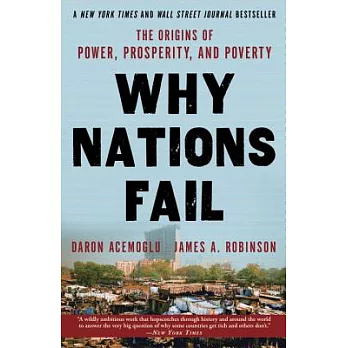《槍炮、病菌與鋼鐵》後,最具啟發性與解釋力的經典之作
克拉克獎章得主,經濟學界最耀眼的新生代大師
諾貝爾經濟學獎得主一致推薦
以截然不同的角度,重新解釋人類社會的命運
為什麼有些國家十分富裕,有些國家卻異常貧困?為什麼窮國都集中在熱帶或下撒哈拉非洲,富國都在溫帶?帶來繁榮富裕的根本原因是什麼?富裕的社會能夠一直繁榮下去嗎?一個社會的貧困與富裕,是如同《槍炮、病菌與鋼鐵》所說,受到風土與物種之類地理因素的影響呢?或是受到宗教文化的影響?也許是窮國的官員想不到好的政策?
作者的研究顯示,窮國之所以貧窮,不是由於命定的地理因素,也不是因為傳統文化作祟。糟糕的政策很可能不是因為執政者愚笨無知,而是他們刻意圖利支持其權力的特權菁英,代價是整體社會的利益。繁榮富裕的關鍵在於這個社會採行何種經濟制度與政治制度。
一個社會若能將經濟機會與經濟利益開放給更多人分享、致力於保護個人權益,並且在政治上廣泛分配權力、建立制衡並鼓勵多元思想,作者稱為廣納型制度,國家就會邁向繁榮富裕。反之,經濟利益與政治權力若只由少數特權菁英把持,作者稱為榨取型制度,則國家必然走向衰敗,即使短期之內出現經濟成長,卻必定無法持續,因為特權階級為了保有自身利益,會利用政治權力阻礙競爭,不但犧牲多數人的利益,也不利於創新,阻礙了整體社會進步。
數千年的全球史也說明,制度可以往更具廣納性的方向移動,也可能會倒退回較具榨取性的狀態,淺層的民主也可能被綁架成為實質的權貴政治。
中世紀的威尼斯因為採行較廣納的政治與經濟制度而邁向富裕繁盛,反過來又帶動制度朝更加廣納的方向前進,盛極一時而稱霸地中海。但早期的菁英豪族不甘於新人輩出瓜分利益,在當時全球最先進的民主制度下反撲成功,將威尼斯快速拉往封閉的榨取方向,因而導致它逐漸衰落。
作者將備受推崇的多年學術成果,化為架構完整順暢易讀的一般讀物。他們以全球史為素材,運用嚴謹的經濟學分析與政治學洞見,幾乎全面檢視歐美亞非等地的歷史發展,並提出簡潔有力的理論解釋。對於臺灣當前的內外處境,此書恰是幫助我們釐清方向的重要啟示。
基於十五年的原創研究,艾塞默魯與羅賓森列舉出許多精采的歷史證據,從羅馬帝國、馬雅城邦、中世紀的威尼斯、蘇聯、拉丁美洲、英國、歐洲、美國與非洲,建立了政治經濟學的嶄新理論,非常貼近當前世界關心的重大課題:
◆中國在威權統治下的經濟發展,是否能持續狂飆並超越西方國家?
◆美國的好日子是否已經到了盡頭?美國是否正從抵抗既得利益菁英擴大自己權力的良性循環,走向讓一小撮人更富有並掌控更多權力的惡性循環?反觀臺灣呢?
◆要幫助數十億貧困國家的人民脫離貧困,最有效的方式是什麼?西方富國提供更高金額的人道援助?或是從本書作者對於政治制度與經濟制度的互動觀察當中找到可行方法?
《國家為什麼會失敗》將會改變你看待世界與理解世界的方式。
★本書中譯版《國家為什麼會失敗:權力、富裕與貧困的根源》由衛城出版。
Brilliant and engagingly written, Why Nations Fail answers the question that has stumped the experts for centuries: Why are some nations rich and others poor, divided by wealth and poverty, health and sickness, food and famine?
Is it culture, the weather, geography? Perhaps ignorance of what the right policies are?
Simply, no. None of these factors is either definitive or destiny. Otherwise, how to explain why Botswana has become one of the fastest growing countries in the world, while other African nations, such as Zimbabwe, the Congo, and Sierra Leone, are mired in poverty and violence?
Daron Acemoglu and James Robinson conclusively show that it is man-made political and economic institutions that underlie economic success (or lack of it). Korea, to take just one of their fascinating examples, is a remarkably homogeneous nation, yet the people of North Korea are among the poorest on earth while their brothers and sisters in South Korea are among the richest. The south forged a society that created incentives, rewarded innovation, and allowed everyone to participate in economic opportunities.
The economic success thus spurred was sustained because the government became accountable and responsive to citizens and the great mass of people. Sadly, the people of the north have endured decades of famine, political repression, and very different economic institutions--with no end in sight. The differences between the Koreas is due to the politics that created these completely different institutional trajectories.
Based on fifteen years of original research Acemoglu and Robinson marshall extraordinary historical evidence from the Roman Empire, the Mayan city-states, medieval Venice, the Soviet Union, Latin America, England, Europe, the United States, and Africa to build a new theory of political economy with great relevance for the big questions of today, including:
- China has built an authoritarian growth machine. Will it continue to grow at such high speed and overwhelm the West?
- Are America's best days behind it? Are we moving from a virtuous circle in which efforts by elites to aggrandize power are resisted to a vicious one that enriches and empowers a small minority?
- What is the most effective way to help move billions of people from the rut of poverty to prosperity? More philanthropy from the wealthy nations of the West? Or learning the hard-won lessons of Acemoglu and Robinson's breakthrough ideas on the interplay between inclusive political and economic institutions?
Why Nations Fail will change the way you look at--and understand--the world.



 天天爆殺
天天爆殺  今日66折
今日66折 
























 博客來
博客來 博客來
博客來 博客來
博客來 博客來
博客來 博客來
博客來